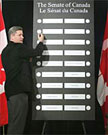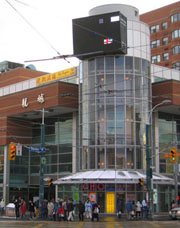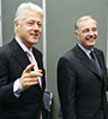Seven pillars of wisdom .. late 2005 odds and ends .. Ralph Goodale and income trusts
Dec 29th, 2005 | By Counterweights Editors | Category: Key Current Issues However you look at it, 2005 is ending with a variety of news confirming how Canadian Liberal leader Paul Martin was right enough when he urged that the Boxing day shootings in Toronto show the “challenge” of the near future. It is at least one kind of progress that this now applies to Canada as much as other parts of North America and the world at large. Here are seven further more or less challenging examples from assorted counterweights editors:
However you look at it, 2005 is ending with a variety of news confirming how Canadian Liberal leader Paul Martin was right enough when he urged that the Boxing day shootings in Toronto show the “challenge” of the near future. It is at least one kind of progress that this now applies to Canada as much as other parts of North America and the world at large. Here are seven further more or less challenging examples from assorted counterweights editors:
(1) In the Canadian election campaign Stephen Harper’s Conservatives came out of the post-Christmas gate with another deft piece of policy-wonk boilerplate, fleshing out their plans for stiffening Canadian military capacity. On Canada’s strategic Pacific Coast the package shrewdly responds to longstanding grievances against Ottawa in the BC emergency management community.
 (2) The December 15 Iraq elections are not working out quite as nicely as the George W. Bush administration and many others would like. A UN official has declared that there is no need for fresh elections – despite the efforts of Sunni and so-called secular Shiite partisans to further their causes by claiming some fundamental widespread fraud on December 15. But for greater certainty an “international team” has nonetheless agreed to review the election results, “at the invitation of the Independent Electoral Commission of Iraq.”
(2) The December 15 Iraq elections are not working out quite as nicely as the George W. Bush administration and many others would like. A UN official has declared that there is no need for fresh elections – despite the efforts of Sunni and so-called secular Shiite partisans to further their causes by claiming some fundamental widespread fraud on December 15. But for greater certainty an “international team” has nonetheless agreed to review the election results, “at the invitation of the Independent Electoral Commission of Iraq.”
(3) One thing the current Canadian election campaign sometimes suggests is that Canadian political debate needs clearer background data on just what the Canadian sector of the North American economy really involves nowadays. The news that Barrick Gold in Toronto and Placer Dome in Vancouver are about to be joined at the hip, to create the single largest gold-mining organization in the world today, is arguably one step in the right direction.
 (4) According to the Associated Press in the USA the Top 10 News Stories of 2005 have been: 1: HURRICANE KATRINA, 2: PAPAL TRANSITION, 3: IRAQ, 4: SUPREME COURT, 5: OIL PRICES, 6: LONDON BOMBINGS, 7: ASIAN QUAKE, 8: TERRI SCHIAVO, 9: CIA LEAK, and 10: BUSH’S STRUGGLES.
(4) According to the Associated Press in the USA the Top 10 News Stories of 2005 have been: 1: HURRICANE KATRINA, 2: PAPAL TRANSITION, 3: IRAQ, 4: SUPREME COURT, 5: OIL PRICES, 6: LONDON BOMBINGS, 7: ASIAN QUAKE, 8: TERRI SCHIAVO, 9: CIA LEAK, and 10: BUSH’S STRUGGLES.
(5) The struggle against Canadian insularity has still not progressed to the point where Canada takes a suitably vigorous interest in its highly strategic North American Free Trade Agreement partner in Mexico. The somewhat more remote relevance of the old Commonwealth institutional cousins down under still gets even shorter shrift.
But at the end of a moving piece on the recent race rioting in his own country, Australian political writer Greg Barns actually asks “Why can’t Australia be more like Canada?” And a New Zealand visitor to Canada, currently working for Stephen Harper’s Conservatives, has sent an intriguing report on the Canadian election back home. There are, apparently, at least a few quite similar political issues in both places today.
 (6) The online Asia Pacific Post has an interesting item on how some new Asian Canadians from BC are viewing the current Canadian federal election campaign – and Canadian politics at large. Canada, it makes you think, sometimes gets a little more credit in some quarters than it probably deserves for rising to the challenges of its new and growing multicultural society. Much no doubt remains to be done here as well – and for all involved, old and new alike.
(6) The online Asia Pacific Post has an interesting item on how some new Asian Canadians from BC are viewing the current Canadian federal election campaign – and Canadian politics at large. Canada, it makes you think, sometimes gets a little more credit in some quarters than it probably deserves for rising to the challenges of its new and growing multicultural society. Much no doubt remains to be done here as well – and for all involved, old and new alike.
(7) Any hope Paul Martin’s Liberals may have for doing better than (or even as good as?) they did in 2004 on January 23, 2006 does seem to depend a lot or even almost entirely on voters in BC and Ontario – with perhaps some special reference to Vancouver and Toronto. And the theory that Jack Layton’s New Democrats, and not Stephen Harper’s Conservatives, could be the big spoilers for the Liberals in Toronto received something of a boost from a recent Christie Blatchford column in the Globe and Mail.
 One Toronto lady with deep Conservative family roots actually seems to be thinking that maybe she should be voting New Democrat in 2006. How many more like her are there out there in the Canadian city with the heart of a loan shark nowadays? And what will Jack-the-Maybe-Giant-Killer have to do to close the deal? The three weeks immediately following New Years’ Day on Sunday, January 1 will reveal the ultimate truth. And right now who really knows just what it will be? As far as Canadian elections go, who could ask for anything more?
One Toronto lady with deep Conservative family roots actually seems to be thinking that maybe she should be voting New Democrat in 2006. How many more like her are there out there in the Canadian city with the heart of a loan shark nowadays? And what will Jack-the-Maybe-Giant-Killer have to do to close the deal? The three weeks immediately following New Years’ Day on Sunday, January 1 will reveal the ultimate truth. And right now who really knows just what it will be? As far as Canadian elections go, who could ask for anything more?
 Unless you think that Ms. Blatchford’s fellow Globe and Mail columnist John Ibbitson is right on the money in his very latest reporting: “Ralph Goodale may have cost the Liberals this election … The news that the RCMP have launched a criminal investigation into stock-market activity surrounding the Finance Minister’s decision not to tax income trusts is stunning.” Most actual voters, on the other hand, do not have investments in income trusts. And again, the ultimate pillar of wisdom right now does seem to remain “who really knows?”
Unless you think that Ms. Blatchford’s fellow Globe and Mail columnist John Ibbitson is right on the money in his very latest reporting: “Ralph Goodale may have cost the Liberals this election … The news that the RCMP have launched a criminal investigation into stock-market activity surrounding the Finance Minister’s decision not to tax income trusts is stunning.” Most actual voters, on the other hand, do not have investments in income trusts. And again, the ultimate pillar of wisdom right now does seem to remain “who really knows?”
Still, Mr. Ibbitson is always well-informed, provocative, entertaining, and well worth reading: “These were supposed to be the quiet days of the campaign. Instead, innocent bystanders are gunned down on Toronto’s Yonge Street on Boxing Day, making law and order an issue, and the RCMP announce they are investigating allegations of insider trading linked to the Finance Department, which is a law-and-order issue of another sort … The most the Liberals can hope for now is that this is as bad as things get.”
Baclkog from December 15: WHAT WERE YOU DOING IN 2005 .. a year of living dangerously ..
According to Simon Schama: “Thoughtful historians are constitutionally allergic to critical dates, preferring instead to de-dramatize turning points’ into long-term developments.”
“But,” this particular thoughtful historian also goes on to relate, “410 was, in fact, one of the genuinely fateful moments in British history.” And who can doubt that, e.g., 1776 was a similar fateful moment in the somewhat related history of the modern USA?
Further forward again, there almost seems a good chance that 2005 will be remembered as some kind of genuinely fateful moment in the history of what Marshall McLuhan started calling the global village in the 1960s. It has in any case been a year when a great rush of disasters – natural, human, and all stops in between – has shown just how challenging the new age of the global village is going to be.
In Marshall McLuhan’s home and native land, another question about 2005 may be looming in the holiday air too – as Canadians ponder who or what to vote for in their federal election on January 23, 2006. Will the future also see 2005 as the year when the still hesitant former British dominion on the obscure northern periphery of the modern giant in the USA, finally started to grow up altogether, at last?
Canada today has “everything, except perhaps ambition”…
 The Economist in the UK captured something of the present Canadian dilemma in its recent report on the country’s current holiday election campaign (which was at least closely studied in Canada, if nowhere else).
The Economist in the UK captured something of the present Canadian dilemma in its recent report on the country’s current holiday election campaign (which was at least closely studied in Canada, if nowhere else).
As summarized in the Toronto Globe and Mail, the “influential British magazine” still finds Canada today “rather cool.” But it judges the former self-governing senior dominion of the old empire on which the sun never dared to set “not at its best, just at the moment.” It is “beset by dysfunctional politics, grumpy anti-Americanism and three brewing political storms: one in the West, one in Quebec and one in its relations with the United States.”
 Not to worry too much, of course. It is only Canada – just a slightly exotic add-on to the United States (and Mexico?), in the largest picture of contemporary global village politics.
Not to worry too much, of course. It is only Canada – just a slightly exotic add-on to the United States (and Mexico?), in the largest picture of contemporary global village politics.
But the great shame, The Economist says, is that Canada today does have some real economic and social potential. Its main problem in fact is that it has “everything, except perhaps ambition.”
The bottom line of the current “dysfunctional politics” …
 On a related reading a bit closer to home, Canada is having a fresh federal election on January 23, 2006 – a mere year and a half after its last federal election on June 28, 2004 – largely because certain longstanding problems in its current federal political structure have finally come home to roost in its federal Parliament, in a dramatically dysfunctional way.
On a related reading a bit closer to home, Canada is having a fresh federal election on January 23, 2006 – a mere year and a half after its last federal election on June 28, 2004 – largely because certain longstanding problems in its current federal political structure have finally come home to roost in its federal Parliament, in a dramatically dysfunctional way.
A thoughtful historian in the spirit of Simon Schama is bound to trace these problems back to the long-term development of Canada’s prolonged disentanglement from the nostalgic folkways of the declining British empire, starting just after the end of the Second World War. In the more recent past, the last time the country tried to reform the obsolete parts of the political structure bequeathed by the old British North America Act of 1867 was the early 1990s.
As many still recall, this did not work at all. Just to mention the key signposts can still induce disagreeable rumblings in millions of Canadian stomachs. To start with, there was the failed Meech Lake Accord of the late 1980s. This led to the failed Charlottetown Accord of 1992. This led to the barely failed second Quebec sovereignty referendum of 1995. And this finally led to the Quebec sponsorship scandal … right down to the present Gomery report and all that.
 The sponsorship scandal, or “Adscam” if you like, is the closest the country’s currently dysfunctional politics (and politicians?) seem able to get to the bottom-line problems right now. But it is not the real issue itself. And that is probably why it does not appear to be all that much of a 2006 election campaign issue so far either.
The sponsorship scandal, or “Adscam” if you like, is the closest the country’s currently dysfunctional politics (and politicians?) seem able to get to the bottom-line problems right now. But it is not the real issue itself. And that is probably why it does not appear to be all that much of a 2006 election campaign issue so far either.
The real issue is that the longstanding problems of Canada’s federal political structure which were finally set aside in the late 1990s have not gone away, as some had vainly hoped. Instead, they have just found new forms of expression in a regionally fractured federal Parliament.
As a result, it at least seems more and more likely that none of the country’s current five more or less serious federal political parties can realistically hope to achieve any stable majority government, all by themselves. And if the election on January 23, 2006 finally does confirm this prognosis, it is no doubt going to require quite a lot of political ambition to grasp the hornet’s nest of the early 1990s once again – in some more seriously constructive and workable way.
At least some high school students (and a few journalists)Â see the big picture …
 Canadian politicians still do not seem to have the required ambition themselves. But a more forward-looking high school student in BC has now opened the door on at least alluding to some of the real issues in the current election hyperbole, by asking Liberal leader Paul Martin a question about Senate reform on the campaign trail.
Canadian politicians still do not seem to have the required ambition themselves. But a more forward-looking high school student in BC has now opened the door on at least alluding to some of the real issues in the current election hyperbole, by asking Liberal leader Paul Martin a question about Senate reform on the campaign trail.
In response, Mr. Martin “said he likes the idea of an elected Senate, but not before it is reformed to give the provinces fairer representation.” A day later Conservative leader Stephen Harper unveiled an apparently more transitional plan for Senate elections and fixed election dates generally in federal politics. (BC and now Ontario too have already moved to fixed election dates in provincial politics.)
 Right at the start of the current federal campaign, Toronto Globe and Mail columnist Lawrence Martin also alluded to an arguably even better way of starting to dig again into the thorny problems of reforming the increasingly obsolete political structure of Canadian federalism. He began by complaining about the “thriving culture of complaint”in Canada today, and how it “contributes to a lack of national confidence necessary to take on new and great challenges.”
Right at the start of the current federal campaign, Toronto Globe and Mail columnist Lawrence Martin also alluded to an arguably even better way of starting to dig again into the thorny problems of reforming the increasingly obsolete political structure of Canadian federalism. He began by complaining about the “thriving culture of complaint”in Canada today, and how it “contributes to a lack of national confidence necessary to take on new and great challenges.”
He then urged, as a case in point: “There hasn’t been a big idea around since John Manley had the guts to say we should take our next step in growing up – and dump the monarchy.” And this recalled a late September 2005 piece by Lawrence Martin’s fellow Globe and Mail columnist, Jeffrey Simpson – on how a bolder and more ambitious Canada could start making some practical progress on this particular big idea right now.
Making today’s Canadian democracy accountable to the people of Canada at last …
 To his credit, Stephen Harper has aptly said that Canada’s present appointed and patronage-ridden Senate is a “relic of the 19th century.” And this is even more true of the country’s appointed office of governor general – a de facto “head of state” still formally accountable to the remarkable aging lady across the ocean who is, first and foremost, Queen of the United Kingdom of Great Britain and Northern Ireland.
To his credit, Stephen Harper has aptly said that Canada’s present appointed and patronage-ridden Senate is a “relic of the 19th century.” And this is even more true of the country’s appointed office of governor general – a de facto “head of state” still formally accountable to the remarkable aging lady across the ocean who is, first and foremost, Queen of the United Kingdom of Great Britain and Northern Ireland.
The day after the official Ottawa “installation” of the “luminous Michaelle Jean” as Canada’s current governor general, this past September 27, 2005, the Globe and Mail‘s Jeffrey Simpson wrote that: “The Governor-General is the Queen’s representative in a country that no longer needs the British royalty. We can now use the time of Madame Jean’s tenure … to resolve how to make the position into Canada’s head of state, in law, as well as fact.”
 The formal office of head of state in today’s Canadian democracy ought to be properly accountable to the free and democratic people of Canada and no one else. That it is not is quite arguably the ultimate foundation of a wider archaic elitist accountability structure which finally goes to the heart of what Justice Gomery called the official “culture of entitlement” in Ottawa, at the very bottom of the dysfunctional politics reflected in the Quebec sponsorship scandal.
The formal office of head of state in today’s Canadian democracy ought to be properly accountable to the free and democratic people of Canada and no one else. That it is not is quite arguably the ultimate foundation of a wider archaic elitist accountability structure which finally goes to the heart of what Justice Gomery called the official “culture of entitlement” in Ottawa, at the very bottom of the dysfunctional politics reflected in the Quebec sponsorship scandal.
As Jeffrey Simpson also alluded to this past September 28, 2005, reforming the current appointed office of governor general would be nowhere near as difficult as those who still gain advantage from this particular relic of the 19th century in Canada’s current federal political structure like to pretend. Actually forging ahead on this front over the five-year term of the luminous Mme Jean could make a highly useful, bold, and ambitious beginning for a stronger, and more enduring new Canada in the increasingly challenging global village of the 21st century.
 No dysfunctional Canadian politician of the moment apparently has the guts to make this an election issue for January 23, 2006. But there are a few encouraging signs that more and more of the voting people of Canada themselves are ready at last to start altogether growing up – in this way and in others to follow, including the brewing political storms in the West and Quebec. (Just think, e.g., of the BC high school student who asked Paul Martin about Senate reform on the current campaign trail.)
No dysfunctional Canadian politician of the moment apparently has the guts to make this an election issue for January 23, 2006. But there are a few encouraging signs that more and more of the voting people of Canada themselves are ready at last to start altogether growing up – in this way and in others to follow, including the brewing political storms in the West and Quebec. (Just think, e.g., of the BC high school student who asked Paul Martin about Senate reform on the current campaign trail.)
If the Liberals – or even less likely, the Conservatives – somehow do manage to secure a working majority government all by themselves on January 23, all such beginnings of bold and ambitious grown-up reform in Canadian federal politics will almost certainly be put back in some box in the basement of the Ottawa Parliament Buildings. Yet right now there still seems a quite good chance that the people of Canada will be delivering a more cunning and challenging verdict, that continues to deny any single party a governing majority, all by itself. And that could ultimately prove a very good thing for the future of Canada. It could just force the dysfunctional politicians to discover some proper ambition at last.
